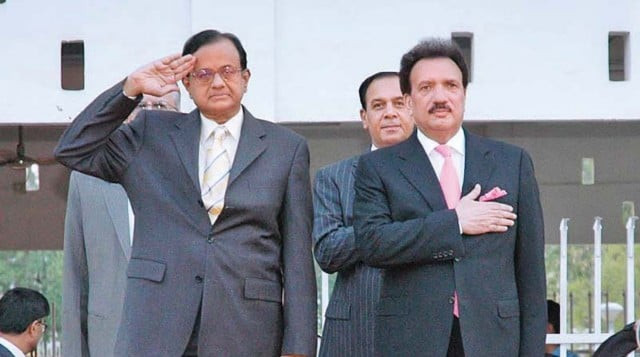Pakistan urges India to move beyond politics of dossiers
Pakistan and India have agreed to continue dialogue and take concrete steps to reduce tension between them.

The consensus emerged during a meeting between Indian Home Minister P Chidambaram and his Pakistani counterpart Rehman Malik.
Chidambaram, who arrived here on a two-day visit, primarily to attend the SAARC Interior Ministers’ Conference being held on Saturday, is the first Indian minister to visit Pakistan after relations between the two countries soured following the Mumbai terror attacks of 2008.
Hours before his meeting with Chidambaram, Rehman Malik said he would “satisfy” the Indian leader on the issue of the Jamaat-ud-Dawa chief Hafiz Saeed. Malik said “instead of exchanging dossiers”, the two countries should “exchange hearts”.
“Hafiz Saeed is an issue. And we will also satisfy Chidambaram on that. We have no problem in that,” Malik told an Indian television channel, when asked about India’s insistence to discuss about Saeed.
India has been expressing its displeasure time and again over action not being taken against Hafiz Saeed. Pakistan has been maintaining that there is not enough evidence to take action against Saeed.
During the - Chidambaram-Malik meeting, a host of issues figured in the discussion. They included war on terror, recent developments in investigation into the Mumbai attacks, the alleged Indian intervention in Balochistan and efforts being made to normalise relations between the two countries.
Sources said the Indian minister welcomed the concept of interior diplomacy suggested by Malik and said his government wanted tension-free relation with Pakistan.
Chidambram said a high-level dialogue between the two countries would be helpful to bridge the trust deficit. “We want to resolve all the core issues through dialogue,” he said, adding Pakistan should take concrete steps against those accused of Mumbai attacks.
The Indian minister agreed to the advice of his Pakistani counterpart to jointly cope with the mutual problems faced by the two countries.
Malik updated Chidambram on the progress made so far in investigation into the Mumbai attacks and court proceedings in this regard.
Malik said the judicial system of Pakistan is independent and transparent while probe into Mumbai attacks is being carried out transparently.
Pakistan wanted to solve all major issues with India through composite dialogue; however, terrorism is a common issue. During the meeting Malik assured his Indian counterpart that Pakistan would not allow its land to be used against India. Talking to the media after the meeting, Malik said that Pak-India dialogue is a good omen for the people of both the countries. He said the meeting with Chidambaram took place in friendly and pleasant environment while it would continue for two days.
Chidambaram said India wanted to know what action Pakistan has taken so far against the Mumbai attack culprits.
Meanwhile, Foreign Minister Shah Mahmood Qureshi also assured Chidambram that Pakistan would never allow anyone to use its borders for launching attacks on any country. He made the assurance during a meeting with the Indian home minister in the Foreign Office.
The two ministers discussed matters of bilateral interest and agreed to strengthen ties and maintain the ongoing trust building measures for result-oriented talks.
Meanwhile, the agenda for the fourth and final day of the third SAARC Ministers’ Conference was finalised here.
Secretary General of SAARC Dr Sheel Kant Sharma and Pakistan’s Interior Secretary Qamar Zaman briefed the media at the conclusion of the third day’s session.
Counter-terrorism initiatives were discussed in detail with Sri Lanka offering to play the role of the consultant to the region in view of their recent success against the LTTE.
Pakistan echoed them same sentiments, saying their recent triumphs in Swat and South Waziristan equipped them to share their experiences as well. Terrorism could only be overcome through regional co-operation.
Regional visa regulations were also reviewed with the hope that journalists, athletes and business persons be included in the SAARC sticker programme that currently benefits parliamentarians. It was decided that each country would discuss the matter with their respective immigration departments.
The SAARC University being established in Delhi was also discussed and it was suggested that the SAARC Institute of Criminology proposed by Pakistan be attached to the University instead of setting up a separate institute in Islamabad. Pakistani students attending the University would be treated the same as those of other SAARC countries with the same visa regulations.
The minister level meetings would ink these suggestions and set the ground for the next round of meeting. The Maldives has offered to host the next round.
Published in The Express Tribune, June 26th, 2010.



















COMMENTS
Comments are moderated and generally will be posted if they are on-topic and not abusive.
For more information, please see our Comments FAQ